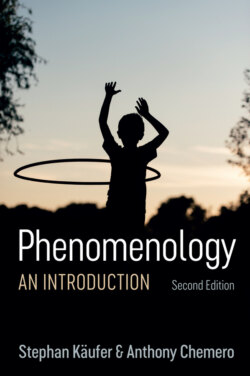Читать книгу Phenomenology - Anthony Chemero - Страница 17
Key terms
Оглавлениеa priori – non-empirical. Intuitions, concepts, and cognitions are a priori if we do not derive them from, or justify them on the basis of, sensory experience.
apperception – Kant’s term for self-consciousness.
cogito – the “I think” that, according to Descartes, constitutes our identities as thinking things. Kant claims that the “I think” must be able to accompany all our representations.
cognition – human knowledge about, or experience of objects. Cognizing objects requires the unification of intuitions and concepts.
cognitivism – Kant’s focus on mental cognition as the basic way in which objects are intelligible to us.
intuitions – the given data yielded by our senses. They are spatially and temporally structured, but not yet cognized.
metaphysics – propositions about the world that are necessarily true and whose truth we can establish without recourse to particular experiences of the world.
refutation of idealism – Kant’s argument that some external, persisting object distinct from us must exist.
representation – mental content, such as intuitions, concepts, ideas, or judgments. We cognize objects by representing them in our minds.
representationalism – the broad philosophical view that objects are intelligible to us only insofar as we have mental representations of them. This view is a commonplace for Kant and eighteenth-century philosophy, but is rejected by phenomenologists from Heidegger onwards.
sensibility – our capacity to be affected by objects. Sensibility yields a manifold of given sense data called intuitions.
synthesis – a cognitive process of combining a manifold of representations by subsuming them under a concept. Synthesis is the precondition for our ability to cognize objects.
synthetic unity of apperception – the role of self-consciousness in making a synthesis of a manifold of representations possible.
threefold synthesis – a basic form of synthesis that makes up the background processing through which we can acquire representations. It consists of three processes that condition one another: apprehending a manifold, distinguishing individual elements of the manifold, and recognizing them according to a concept.
transcendental deduction – a key argument in Kant’s Critique of Pure Reason. Kant argues that the processes that enable self-consciousness also make cognition of empirical objects possible according to general rules.
transcendental idealism – Kant’s claim that the objects of experience are empirically real, yet transcendentally ideal. This means that anything we can experience as an object is structured by a general lawfulness. However, we cannot know anything about the nature of things considered beyond the human standpoint.
transcendental philosophy – Kant’s philosophical stance in the Critique of Pure Reason. Transcendental philosophy aims to uncover the hidden background conditions that make experience possible and structure experience according to general rules.
understanding (Verstand) – Kant’s term for our capacity to use concepts.
